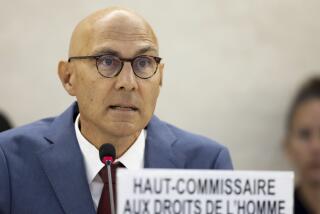Democracy Is the People’s Only Defense : Human rights: Envoys of despotic states threaten to make the Vienna conference a sham.
- Share via
Next week, in Vienna, a World Conference on Human Rights will be convened for the first time in 25 years. It is an international event of great significance, and it could very well serve to fundamentally strengthen and enhance human rights around the world. With the spread of ethnic, religious and national conflicts, the idea of having such a conference is a welcome one. But it also has the potential of turning into a theater of the absurd, marked by surrealistic scenes of hypocrisy and double standards.
Among the participants at the conference will be representatives from various totalitarian, non-democratic and inhumane regimes. They view the conference not as a forum for discussing human rights, but as a means of covering up their own abuses of those very same rights. Such countries will no doubt seize upon the massive media presence to preach to others about the need to respect human rights, even as they trample upon them back home.
Sadly, it would not be the first time that such absurd ironies have occurred. It is a fact of life at the United Nations that representatives of countries such as Iraq or the Sudan, which are among the worst abusers of human rights, will ascend the podium, muster up a pretense of righteous indignation and proceed to discourse about the failings of the West and various democratic countries.
Such countries will try to throw up a smoke screen around their own abuses. Should they succeed in doing so, it will only serve to undermine the effectiveness of the conference. Despots should be exposed for their cynical manipulation of the issue of human rights.
Very few nations, however, are ready to face the reality of the global human-rights situation with honesty and courage. Too many are just paying lip service to it, instead of addressing the substance of the matter. And the substance is not the symptoms of the disease, but rather the disease itself: a lack of democracy in about 135 of the 183 U.N. member states.
In recent years, there have been unprecedented changes as the Soviet Union collapsed, totalitarianism in Eastern Europe was swept away and some of the authoritarian regimes in Latin America fell. In their place, democracy took root. But the fact remains that only a minority of countries around the world currently enjoy truly democratic systems.
Democracy is essential, because it is the basis for stability and peace. Never has one democracy gone to war against another democracy. That was not the result of mere chance; it was a result of the nature of democratic government. For only a democratic government is fully accountable to its people, and is based on checks and balances.
With the spread of extreme nationalism and xenophobia, and the consequent violations of human rights that accompany them, it is all the more crucial that steps be taken now to foster a worldwide process of democratization. The gassing of the Kurds in northern Iraq, the genocide in Cambodia in the 1970s and the labor camps of the Gulag all resulted in part from the absence of democracy. To prevent such persecution from recurring against other vulnerable minorities, it is imperative that democracy be enshrined as the governing ideology in nations across the globe.
That is the message that must emerge, clearly and firmly, from the World Conference on Human Rights in Vienna. The conference should serve as a framework for replacing lip service with truth and slogans with substance. It is the task of the democratic countries, with the leadership of the United States, to ensure that it does.
More to Read
Sign up for Essential California
The most important California stories and recommendations in your inbox every morning.
You may occasionally receive promotional content from the Los Angeles Times.










